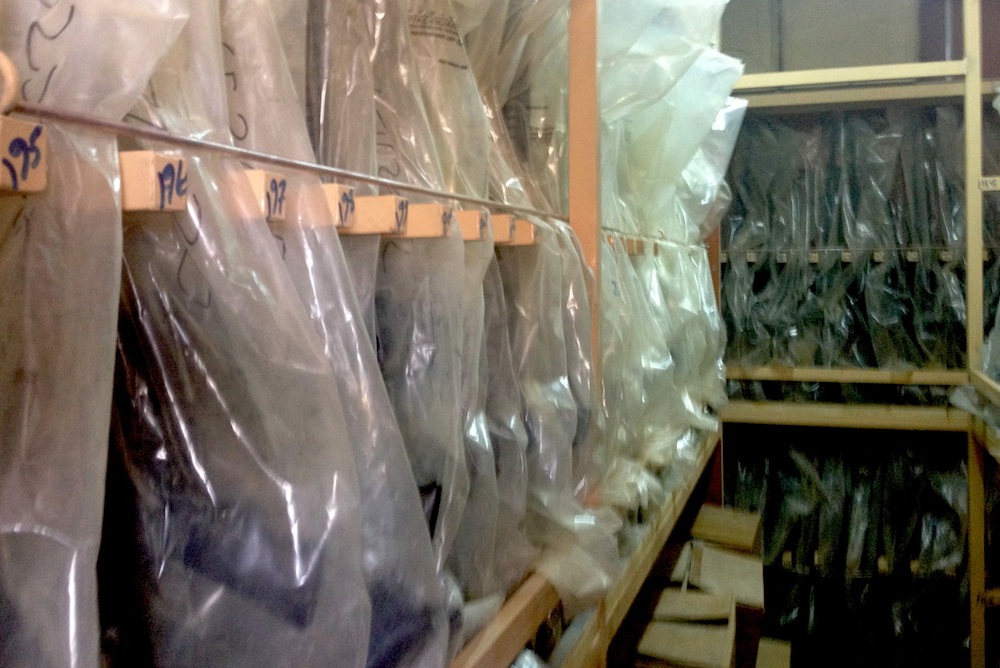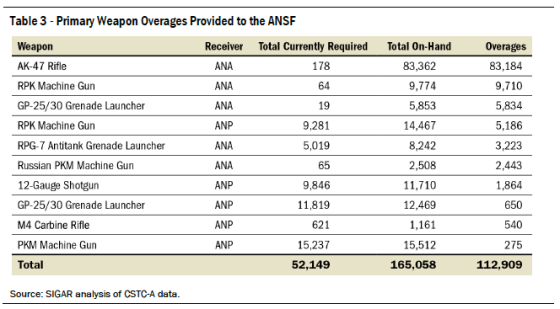
The bad news out of Afghanistan this week is that the U.S. military’s accounting for the arsenals the Pentagon is giving to Afghan security forces is plagued by “incompatible inventory systems” that generate “missing serial numbers, inaccurate shipping and receiving dates, and duplicate records,” according to a new report from the top U.S. government investigator inside Afghanistan.
The worse news? The problems become “far more severe” once the weapons are in the hands of the Afghan forces. “Given the Afghan government’s limited ability to account for or properly dispose of these weapons, there is a real potential for these weapons to fall into the hands of insurgents, which will pose additional risks to U.S. personnel, the Afghan National Security Forces, and Afghan civilians,” according to John Sopko, the special inspector general for Afghanistan reconstruction.
Sopko and the U.N. have made clear in recent years that the production of opium in Afghanistan is growing with every passing year. Sopko’s latest report, released Monday, makes clear that Afghanistan is also awash in undocumented American-supplied arms.
As the U.S. pulls its combat troops out of Afghanistan by the end of this year, proper accounting and tracking of the arms become critical for Afghan forces to battle the Taliban — and to keep those weapons out of enemy hands. “Taliban fighters are scoring early gains in several strategic areas near the capital this summer, inflicting heavy casualties and casting new doubt on the ability of Afghan forces to contain the insurgency as the United States moves to complete its withdrawal of combat troops,” the New York Times reported Sunday.
“We’re not talking just handguns and M-16s and AK-47s,” Sopko told TIME correspondents over lunch on Friday. “We’re talking some high-powered stuff — grenade launchers, RPGs, machine guns — anything that one person could use.” His new report says the U.S. recorded improperly, or simply failed to record, the serial numbers of 43% of the nearly half-million small arms the U.S. has supplied Afghanistan over the past decade.
Sloppy U.S. record keeping is compounded by Afghanistan’s indifference to the congressionally mandated U.S. oversight of the weapons’ whereabouts. “When we went there and said, ‘We want to see how the Afghans handle this,’ the Afghans refused to let us in to check the weapons” at one facility in Kabul, Sopko said. U.S. military officials told Sopko’s auditors they’d get them in. “We showed up and guess what — everybody was attending a funeral,” Sopko said. “We could not get in. When our guys tried to take pictures, all of a sudden, whoa, the Afghans kicked us out — and our U.S. military couldn’t get us in.”
The problem of untracked weapons, according to excerpts from the 28-page report, is likely to get worse:
As of November 2013, more than 112,000 weapons provided to the Afghan National Army and Afghan National Police exceed requirements in the current [Afghan government requirement] …
The Afghan National Army has 83,184 more AK-47s than needed because, prior to 2010, DOD issued both NATO-standard weapons, such as M-16s, and non-standard weapons, such as AK-47s. After 2010, DOD and the Afghan Ministry of Defense determined that interoperability and logistics would be enhanced if the Afghan National Army used only NATO standard weapons. Subsequently, the requirement was changed. However, no provision was made to return or destroy non-standard weapons, such as AK-47s, that were no longer needed …
This problem of the Afghan National Security Forces having more weapons than needed is likely to be exacerbated as the number of ANSF personnel decreases to lower levels in the coming years. Specifically, the current requirements in the [Afghan government requirement] are based on supporting the ANSF at a surge strength of 352,000 personnel. At the Chicago Summit held in May 2012, the international community and Afghan government approved a preliminary model for a reduction of the ANSF force strength by 123,500 personnel to a total of 228,500 by 2017. [U.S. military commanders in Afghanistan] told us they are still planning on providing weapons at the 352,000 personnel level because that is the number stated in the current [Afghan government requirement].
Part of the accountability problem, the report notes, stems from imposing rules that require schooling in a country without much of it. “Efforts to develop the capabilities of Afghan National Security Forces personnel to manage the central depots,” it says, “have been hindered by the lack of basic education or skills among ANSF personnel.”
More Must-Reads from TIME
- Inside Elon Musk’s War on Washington
- Why Do More Young Adults Have Cancer?
- Colman Domingo Leads With Radical Love
- 11 New Books to Read in February
- How to Get Better at Doing Things Alone
- Cecily Strong on Goober the Clown
- Column: The Rise of America’s Broligarchy
- Introducing the 2025 Closers
Contact us at letters@time.com
